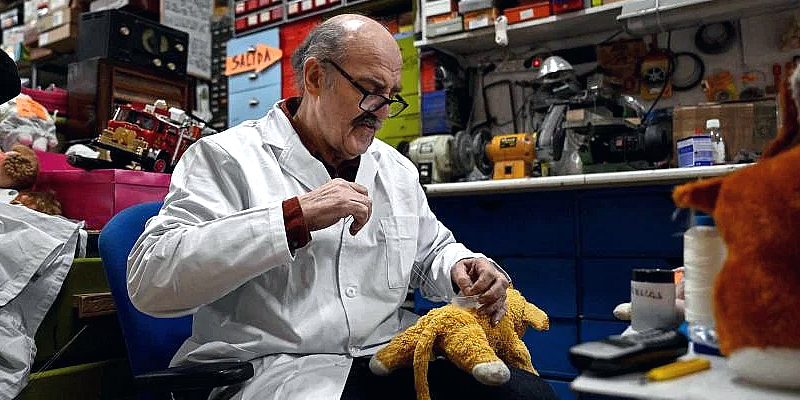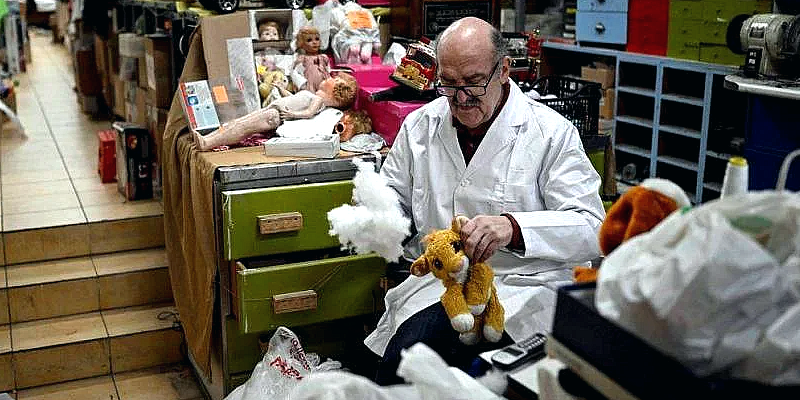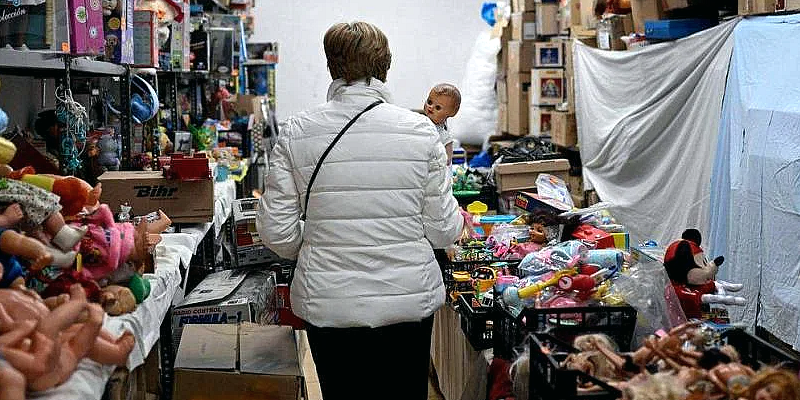MADRID: Wearing a white lab coat, a screwdriver in hand, Antonio Martínez Rivas examines a remote-controlled car at his workshop in Madrid, a “toy hospital” which is about to close its doors after 50 years of repairs.
His bespectacled eyes focused on the task in hand, this 70-year-old toy specialist, who will retire on December 31, is hunched over his “operating table” just days before his workshop’s last Christmas.
“Now it’s me they are going to repair,” he tells a customer in his gravelly voice, alluding to his ongoing battle with cancer.
Lit by a neon light and surrounded by tools and spare parts, his workbench is in the corner of a veritable Aladdin’s cave with thousands of colorful toys packing shelves that reach from floor to ceiling.
Among them are dolls, teddy bears, board games, wooden horses and more, all sent in by customers from Spain, France, Britain, Portugal and even as far away as Uruguay.
“We are the only ones working on every type of toy” in Spain, said Rivas, a Madrid native who learnt from his father how to repair toys.
“You don’t learn this in school,” he told AFP.

‘The toy’s essence’
Most customers are “adults who are nostalgic about something they had as a child,” he said.
“Some tell me: ‘don’t change it’. And if you want to put new stuffing in, they tell you to leave what’s already there because that’s part of the toy’s essence,” he explained.
“There are those who think like that just as there are those who talk to their dolls.”
David Hinojal, 40, has come to pick up a cuddly monkey which squeaks when its tummy is squeezed.
“I bought him as a present for my mother-in-law years ago and, after she died, we kept him because we’re very fond of him,” smiled Hinojal, who works in tourism.
Some even make the trip to Madrid just to visit Rivas’ toy hospital, like Julia Fernandez and her husband, who have come from Barcelona.
“We heard the toy hospital was going to close and we thought it would be really interesting to visit it,” the 60-year-old teacher told AFP.
“It’s a real art and we’re leaving with a sense of nostalgia and sadness but also really glad that we were able to come,” she admitted, saying she’d seen a small slide projector and a papier-mâché horse like ones she’d had as a child.

Learning to value toys
“To be honest, it’s a real shame it’s closing.. because it’s a way of recycling toys so you don’t keep buying more,” said Hinojal.
For the elderly toy mender, the work is about appreciating toys.
“We need to value toys more.. If we keep on throwing them out without rhyme nor reason, we’re going to be drowning in rubbish,” said Rivas, whose retirement ends a decades long family tradition.
His father opened a small shop of hand-made toys in 1945 before turning increasingly to repairs following the mass influx of plastic toys in the 1950s and 60s.
“When I came back from school when I was 12 or 13, I would finish my homework and sit with him at his workbench and learn how to do it,” he said, recalling how he learnt woodwork, arts and crafts, clock-making, mechanics and electrics.

From customers to friends
He took over the workshop from his father in the 1970s and, working alone, he had to deal with the arrival of the video games that caused interest in traditional toys to fall.
“Now they’ve all got tablets, mobiles or consoles,” he sighs.
None of his three children has shown any interest in taking up his trade and the few interns who have worked with him know that it “pays nothing”.
“You can be working 10 to 12 hours a day and you only early 8 to 10 euros an hour ($8.50 – $10.50),” Rivas says.
Even so, it’s not easy to close.
“After so many years, you feel a lot of sadness (at closing) because there are so many customers who have become friends,” he admits, his head bowed.
As a tribute, his friends have put up a sign behind the counter that reads: “Almost everything for sale (the boss wouldn’t let us put a price tag on him).”
ADVERTISEMENT
ADVERTISEMENT








































